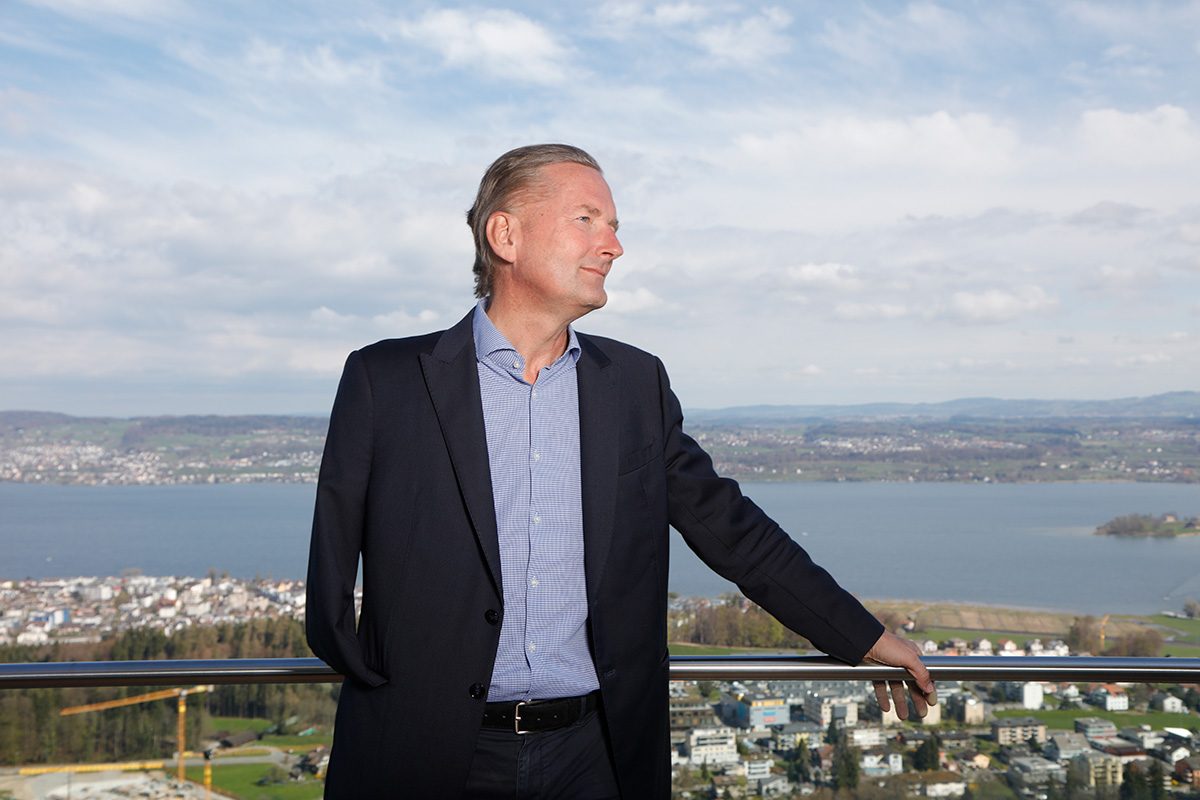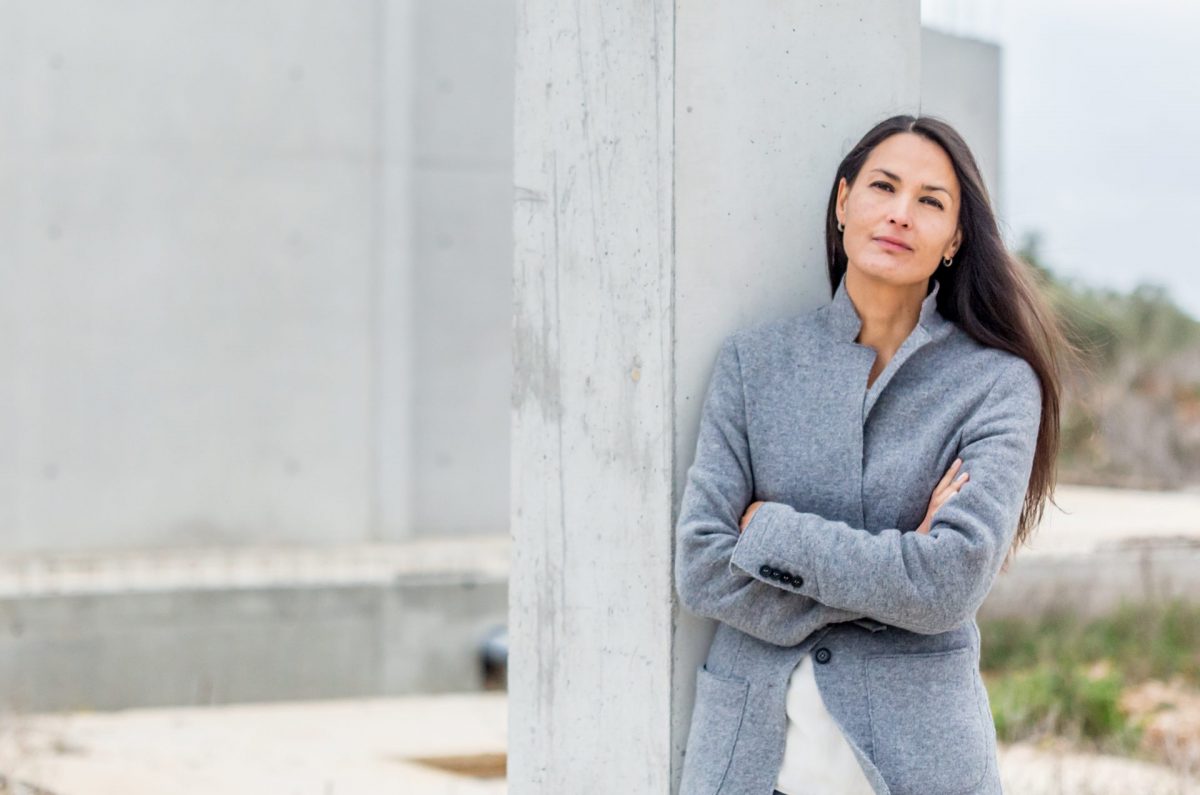
“And suddenly, I was scared to death.” Marco Büchel, 47, former ski racer
He wasn’t the most talented, but his fighting spirit took him to the top. Until one morning, when he could hardly get out of the starting gate.
Marco Büchel is a vision. There’s something urbane and definitely very striking about how he walks into Razzia, a restaurant in Zurich, Switzerland – extremely well-dressed in gray wool pants and a blue shirt, bronzed by the mountain sun, with a dark beard, looking kind of like a hipster, but light years healthier than the city version – just days after Johnny Depp paid a visit. This has nothing to do with him and our interview, which is why I’m thinking of taking this line back out. You know what? Actually, I’ll just let it stand. Marco Büchel and Johnny Depp. They both exude cool.
Although our meeting started on a lighthearted note – we arranged to see each other as we were both tinkering with similar projects and wanted to chat – it became a conversation that lasted several hours that was just right for No Gloss magazine.
For those of you who like to know the facts before they take a closer look at someone, here’s a description of Marco Büchel’s career in brief:
Born in Liechtenstein, Büchel won four World Cup races, received a medal in 18 World Cup races, achieved 90 top 10 placings in the World Cup, took part in the Winter Olympics six times and won the “Sportsperson of the Year” award in Liechtenstein eight times.
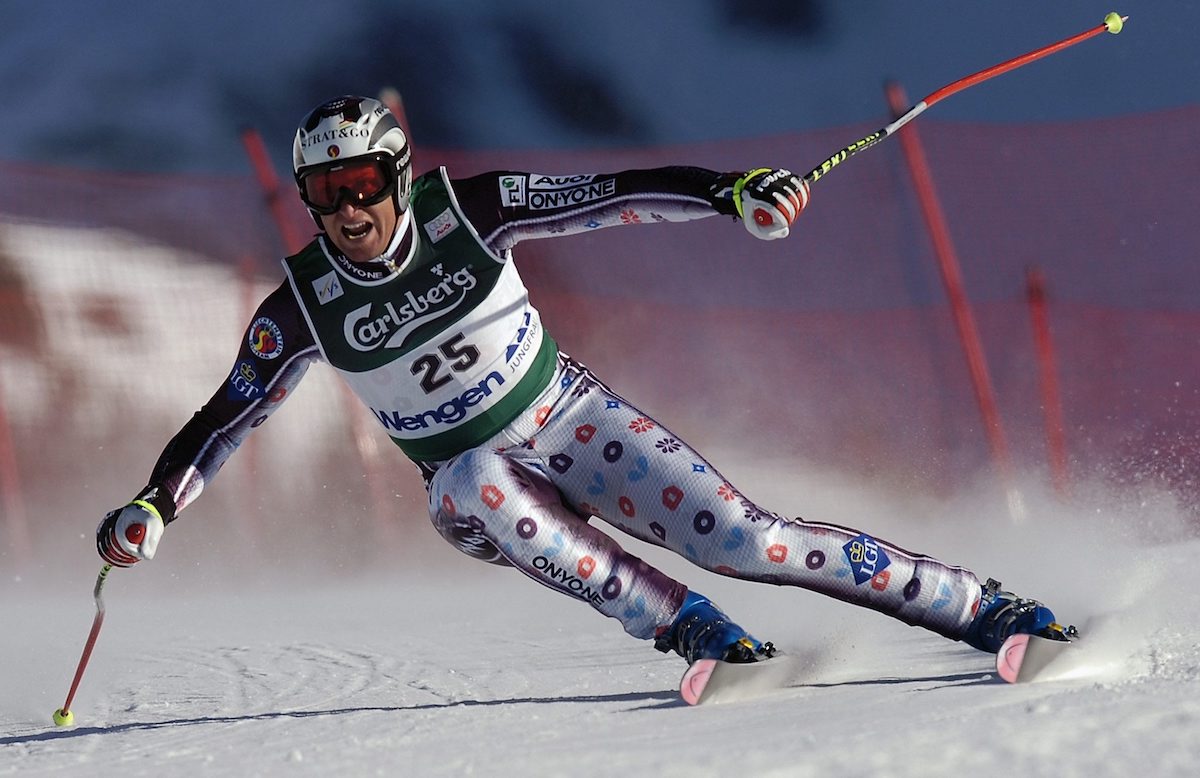
Marco Büchel at the Lauberhorn downhill in Wengen, Switzerland, January 2006. KEYSTONE/Eddy Risch
“What am I doing here? I don’t want this.”
When I’ve watched sports on TV, I’ve often asked myself two questions:
1. How do the ski racers feel at the starting gate, facing a vertical wall that leads into the valley and sparks a sense of pure horror in those of us who don’t take part?
This is exactly what Büchel wrote about with his wife Doris in the impressive article for Swiss publication Das Magazin, “20 minutes to go”. Here is an extract:
I enter the hallowed hall, as I call this space: white floor, white walls, white ceiling, blue halogen lights. There are only a few people in here. Those who speak do so quietly. The walls are hung with pictures of the greats. The legends are all immortalized here: Sailer, Klammer, Strobl, Cuche. I have no time for pictures. I know how huge the legend of Kitzbühel is. I know how much history there is in this place. I know all too well. I know the route. Every single centimeter. I can feel it.
It’s steep. It’s icy. It’s blue.
Blue, bare ice.
What am I doing here?
I don’t want this.
I want to turn back. Get out of here.
How I’d love to switch places now.
Watch at the finish line as others dash down here, preferably with a mug of mulled wine in hand.
Not be here.
Not now.
No.
No.
My stomach does somersaults.
I don’t feel good.
My heart is thumping.
My mouth is dry.
Damn lump in my throat.
2. What does a professional athlete do when the competitive career is over? When suddenly, instead of snow and golden medals, you are faced with a big nothingness, and it is up to you to reconquer life and create a new place for yourself?
Marco Büchel answered both of these questions – and many more besides. He did so with such unsparing honesty that I believe many people will be able to identify with him and his thoughts.
All those I have spoken to and gotten to know in recent months, most of them aged between 40 and 55, all in search of the elixir for their lives’ second act.
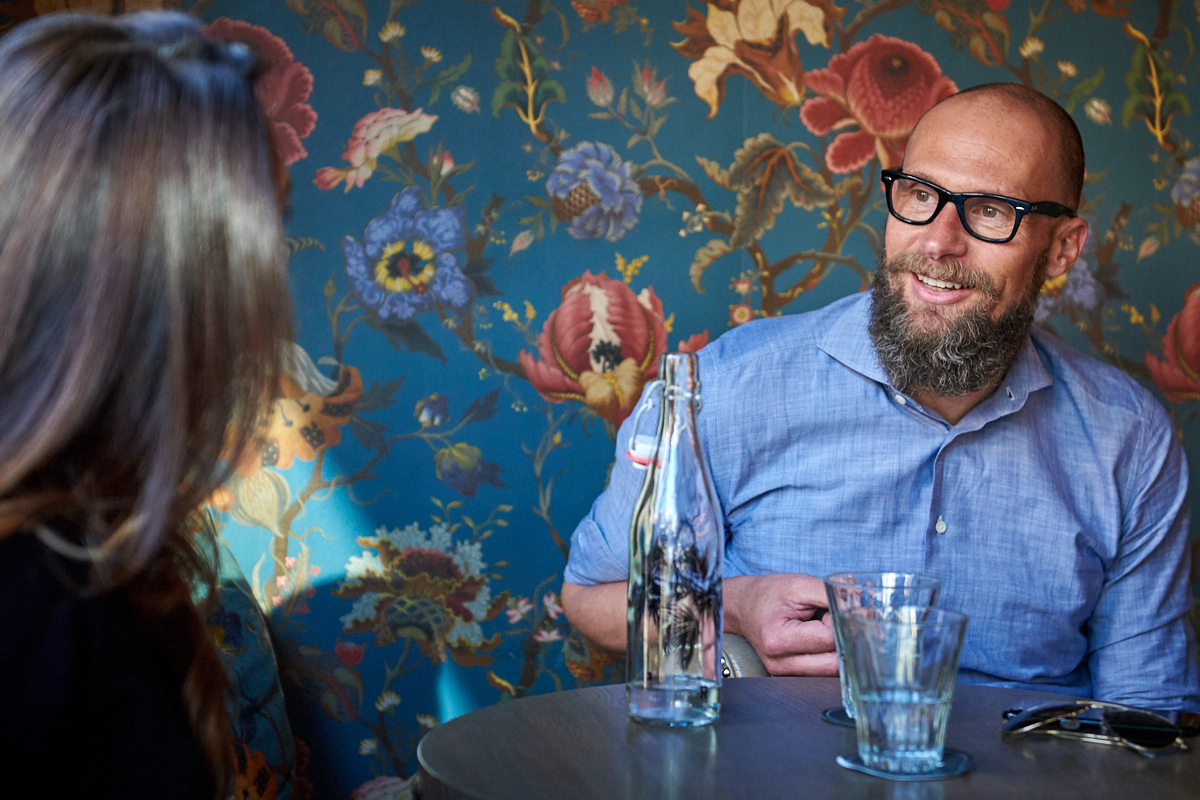 “That was when I began training like a man obsessed.”
“That was when I began training like a man obsessed.”
Anna Maier: Have you had a good start to your life’s second act? Have you found a new kind of fulfillment?
Marco Büchel: That’s not an easy question for me to answer. On one hand, I’ve got nothing to complain about. I do skiing commentary and analysis for the German TV broadcaster ZDF. I give lectures and talks on my time in the skiing circus. I’m a representative for various companies. I’ve had Doris by my side for 18 years. And – oh yeah – I’ve opened a sports center for elite athletes in Liechtenstein with my best friend, a former barman, now a coach, doing what really should have been officially provided.
But?
On the other hand, there’s no substitute for the life I led as a ski racer. It was my everything. It was my purpose in life. For me, it wasn’t a job. Traveling, racing: it was all just pure emotion. And nothing can replace that. And sometimes I think: I’ve just thrown it all away. Everything that mattered to me professionally is gone now.
Is this the benefit of hindsight or did you feel like this while you were competing, too?
Oh yeah! I loved it. I wasn’t the most talented, you know.
You’re kidding!
No, it’s really true. People said I’d come to nothing, never mind becoming a skier.
In fact, out of all the young talent who trained with me back then, it’s only Didier Cuche and I who made it. For me, it was just about drive. I fought my way to the top. I really wanted it.
My father said: as a minimum, you’ll do a commercial apprenticeship, otherwise I’m not supporting anything. My mother was enthusiastic from the start. So I trained as a salesman. Then I wanted to focus fully on ski racing. My father accepted my decision.
After two years as a professional athlete, he threatened to make me work in his company because of my lack of results. We agreed that I would get a little more time. That was when I began training like a man obsessed.
Once, on a flight back from the World Championships in Morioka (Japan, 1993), I sat next to my boyhood idol, Andreas Wenzel, and talked his head off. He had a glass of wine and eventually he said: “You’d be better off renting out sun loungers in St. Tropez, because you’ll never make it.” That hit home.
And you wanted to prove to him that you could do it, after all.
I wanted to prove that someone with less natural talent but a lot of ambition can also be successful in life.
Something funny happened: when I received a royal welcome in Liechtenstein as runner-up in the World Championship and had to give an interview in a radio studio, the door opened and there was a surprise guest. You’ve got three guesses who it was.
And did he congratulate you then?
Yes, he did. This feeling of finally coming back a success and being appreciated was a good one. I took six years to reach the top.
And you were the oldest winner of a World Cup race.
Yes. Didier Cuche beat me later. Aged over 37 in Kitzbühel, he was a little older than me.
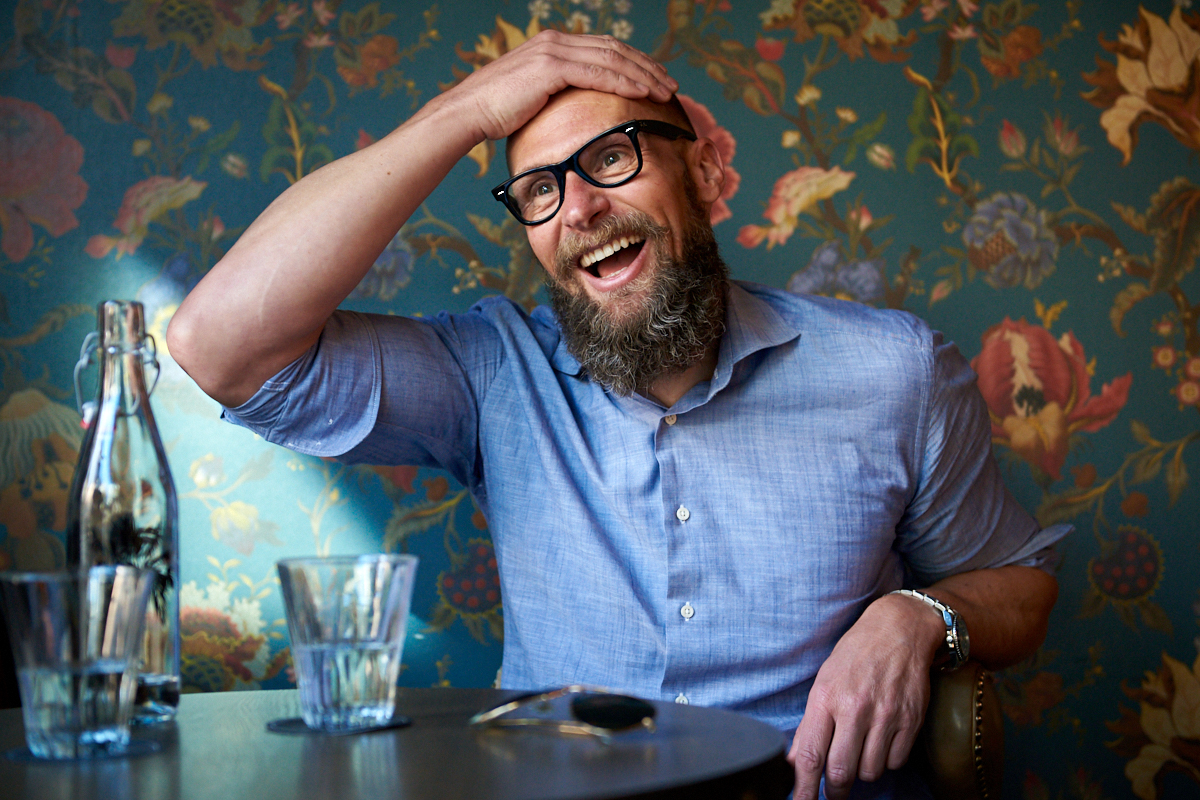 “It’s a thrill.”
“It’s a thrill.”
You talk about a purpose in life. What made ski racing stand out for you?
I can’t describe it. It’s a thrill. Such an intense time, experiencing life, seeing the world at the same time, where else do you have that? It spurred me on, a life in the fast lane.
How did you support yourself in the six years it took for you to be placed among the 10 best skiers in a race for the first time?
I received a support grant of 20,000 francs from the Liechtenstein Sport Association – for a year. The Liechtenstein Ski Association paid for my travel. I had a car. Somehow I managed.
And money never mattered to me. You don’t do this job for money or fame. The main thing that drove me was emotion. I experienced so many things as a skier. I sometimes tell these stories at talks.
What are the most important stories and experiences that have stayed with you?
There was the time Florian Eisath from Italy lost both his ski poles at the start and still got a faster time than me.
The moment you realize you’ve won your first ever World Cup race. I always pictured, and expected, that I would be overcome with emotions. And then I stood there and felt nothing at first. It was only later, in my hotel room, that I wept with happiness.
Or that moment at the beginning of the second heat of the giant slalom at the World Championships in Vail in 1999. I was leading the first race, which made me half-time world champion. I still didn’t have it in the bag and had to put in another world-class performance to win a medal. I knew rationally that this moment would shape me forever. At the same time, I was emotionally very stable and completely calm.
But the worst was surely on the morning of the World Championship downhill in Val d’Isère in 2009, when I woke up and was almost overwhelmed by the feeling of a huge weight on my chest. I could hardly move. An incredible fear spread through me. From one moment to the next. Suddenly, I couldn’t handle this pressure any longer.
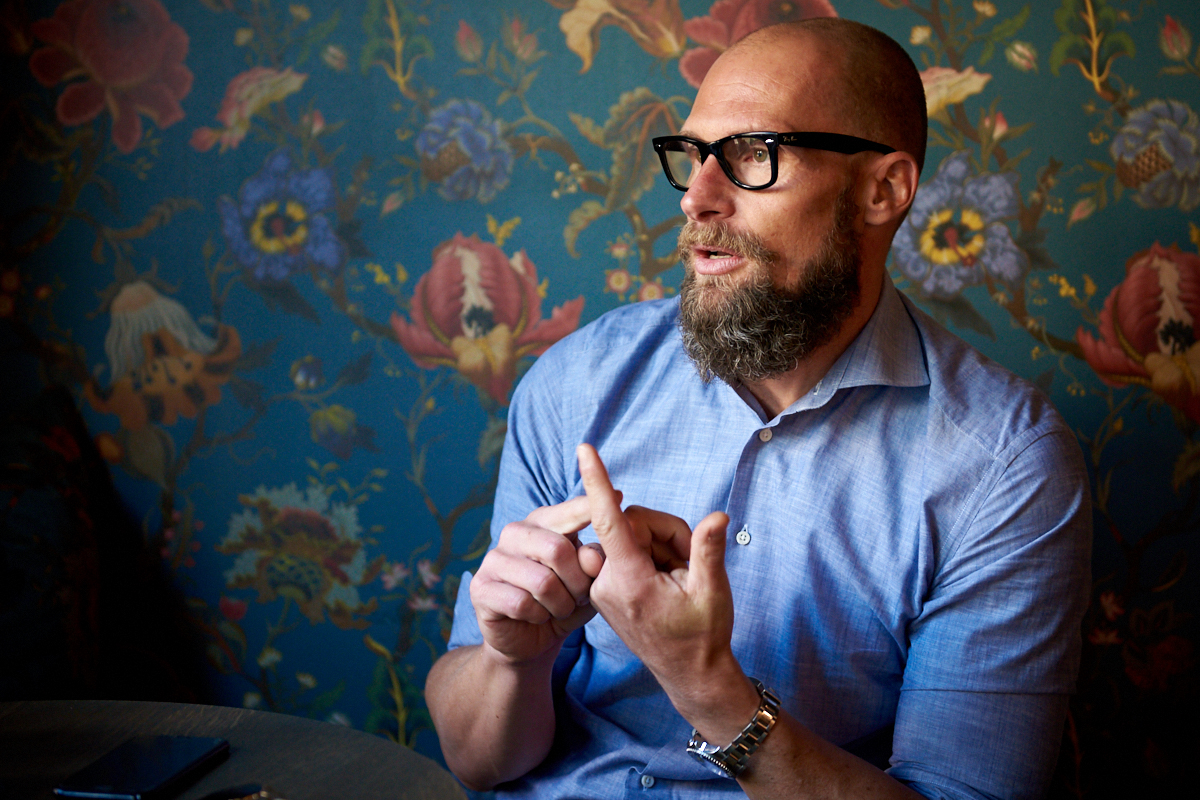 “I stood there not knowing how I’d get down alive.”
“I stood there not knowing how I’d get down alive.”
Were there any signs of this feeling before?
Not at all. It was as if someone had flicked a switch. Until then, I had always associated skiing with a great deal of pleasure. I was very good at dealing with extreme situations. And suddenly, I could no longer cope with the enormous pressure.
I somehow managed to struggle into the starting gate. I stood there not knowing how I’d get down alive.
Nevertheless, I ran the race. I finished fourth. Fourth! And practically skied right in front of a TV camera.
I was asked how much it bothered me to wind up only in fourth place. Tears came to my eyes and the cameraman zoomed in. It killed me. I was done. I only had a little dignity left. I finished the interview, turned around and cried.
Looking back now, I would say that back then, in that moment, I was having a nervous breakdown. Everything that had built up inside me for weeks and months came out.
The pressure?
The expectation, my own ambition, my age. I don’t know. I was actually supposed to take part in more races during that World Cup. Instead, I went to Zurich airport, bought a ticket to Miami and I was gone.
You left in the middle of the season?
Yes. I just had to get away. I told the ski team I wouldn’t be available for a week and they shouldn’t even try to get hold of me.
Wow. And there was no reaction?
No. I was actually unavailable, too. Ten hours later, I was on a sun lounger at a beach bar in Miami with a bucket of mojito in front of me. I looked up at the dark night sky and had the biggest grin on my face you could imagine.
Why? What was happening in that moment?
I felt free. Unbelievably free. As if I had freed myself from shackles. And I felt alive. I didn’t care about coming fourth in the downhill. I felt emotion, and after all, that was the reason why I was a skier.
In that moment, I decided I would do one last season and then announce my retirement. I still had one major goal: a podium position at the Lauberhorn downhill in Wengen. And I managed that, too. Just a hundredth of a second in front of fourth place. I said: “That’s the way to end a career.”
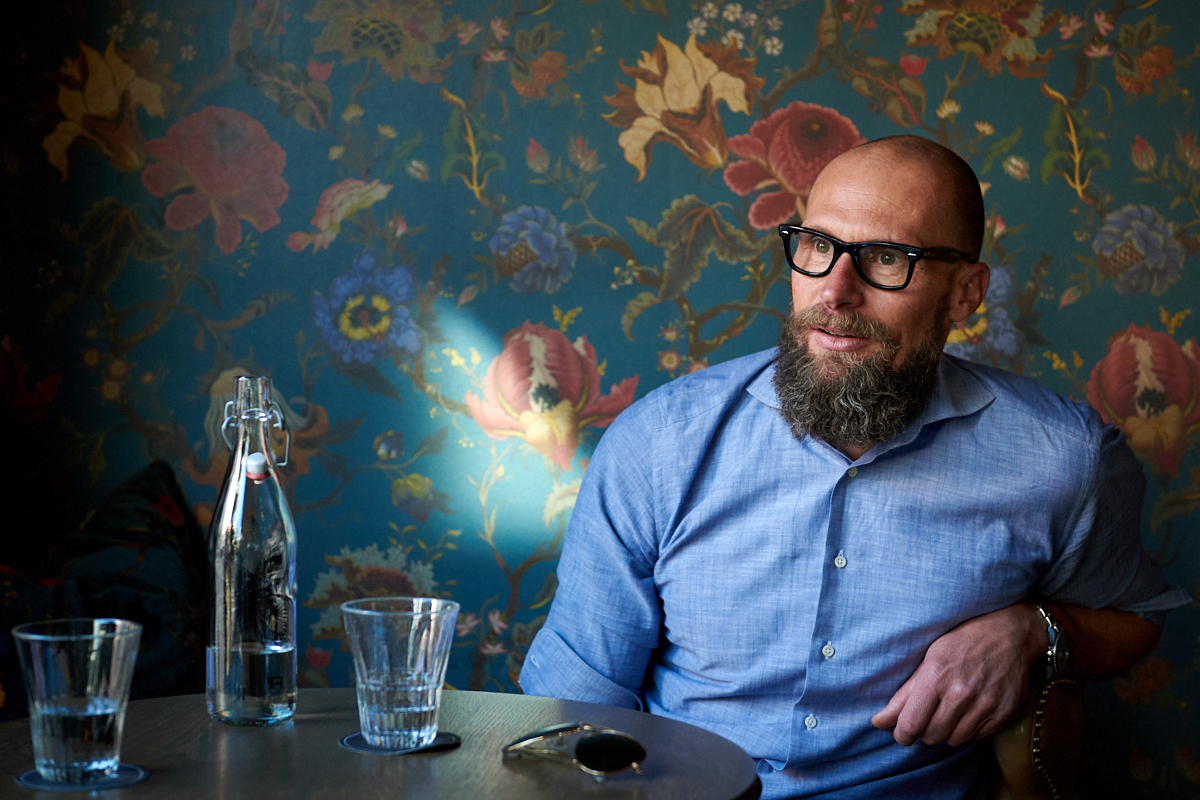 “In that moment, it felt like madness.”
“In that moment, it felt like madness.”
And yet it was surely still very difficult for you to bid farewell to your life’s dream.
Yes, it was. I’d planned it all by myself, of my own volition. And yet in that moment, it felt like madness. As if I was making the biggest mistake of my life. I was healthy and at the pinnacle. I could still do another couple years!
But at the same time, it also was the best decision I ever made in my life. I had battled fears throughout the entire season. I also felt past my peak in terms of performance.
And instead, you were gazing into the great unknown?
Not really. I was lucky that – even before I had finished my career as an athlete – I already had the offer on the table from ZDF (German public-service television broadcaster) to commentate on skiing. ZDF! And one of the sponsors made me an offer for another collaboration.
When I look at how much work I was doing, there was no period of boredom, no trip to find myself or keep myself busy, but I missed my own purpose in life. There’s no substitute for that. But I’m happy, because I’ve got it all.
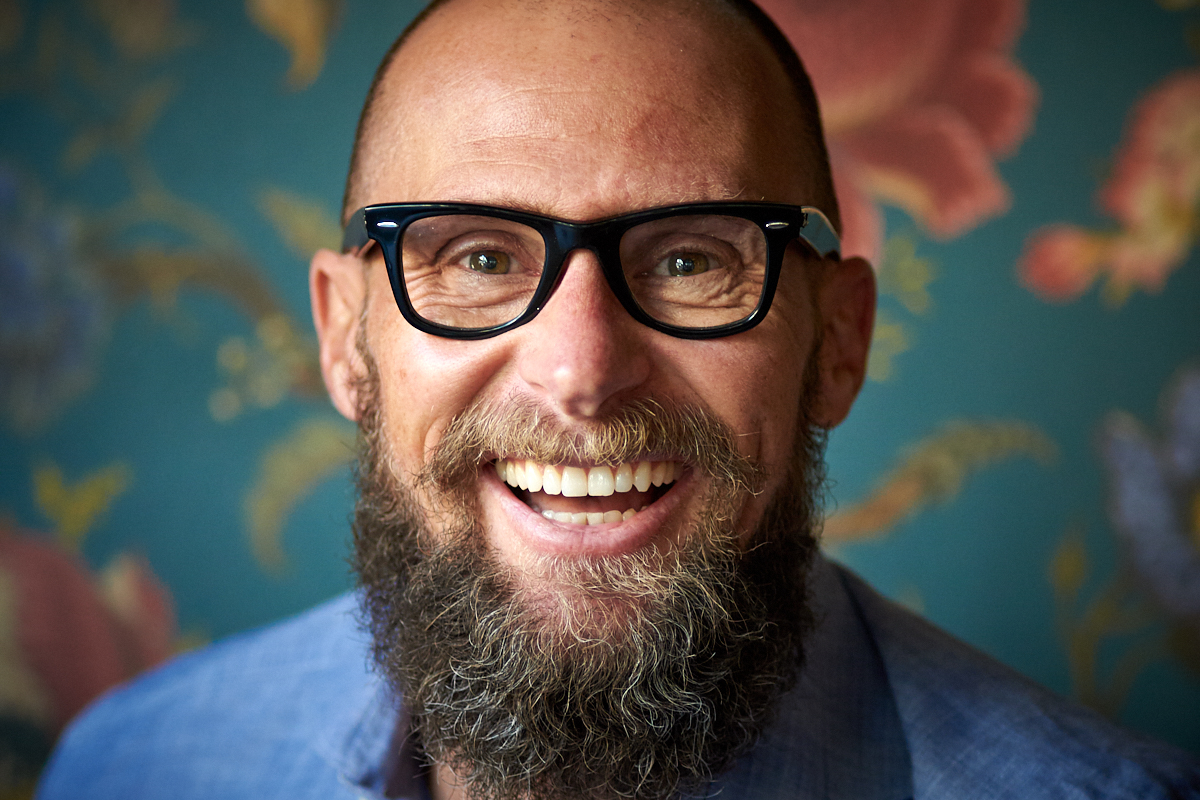 “They told me I wasn’t famous enough.”
“They told me I wasn’t famous enough.”
Besides the fact that you had to say goodbye to a dream, and an entire era.
I’m trying to keep that time alive with the talks and stories. I would have loved to have written a book about it. The publishing houses haven’t shown much interest so far. They told me I wasn’t famous enough.
Really? To me, it seems like you’re a famous face.
Of course, I’m known in Liechtenstein and in rural areas of Switzerland. Not at all in Zurich. And I’ve had very few requests for my talks in Germany thus far, although I’m on ZDF regularly and viewing figures are nice and high, as they usually are for ski racing.
I think the stories from the world of skiing I put on paper with my wife Doris go down well. They inspire emotion. For me, that’s still all that matters.
Isn’t conflict par for the course when a couple works together on a passion project?
We do have discussions now and then, and sometimes we do drive each other to distraction, but no, we have the same goal in mind. And we know each other inside out. After 18 years, there are no more secrets to reveal.
Where did you meet?
Should I really tell the story…? No judgment, please!
Now I’m looking forward to it!
In an aerobics class. At a young age, Doris decided she wanted to teach aerobics classes, like Jane Fonda. The bank believed in her idea and gave her money to start her own business. Soon, her classes were the big draw in the area. Two of my ex-girlfriends took me.
What a sight to behold!
I knew you’d laugh!
Eventually we met again in a bar. It felt like Cupid was right there with us.
Was she with you throughout your entire sporting career?
I had just won my silver medal at the World Cup in Vail in 1999. She has since changed careers. She now earns her living through writing. She’s a journalist, author and publisher. We support each other.
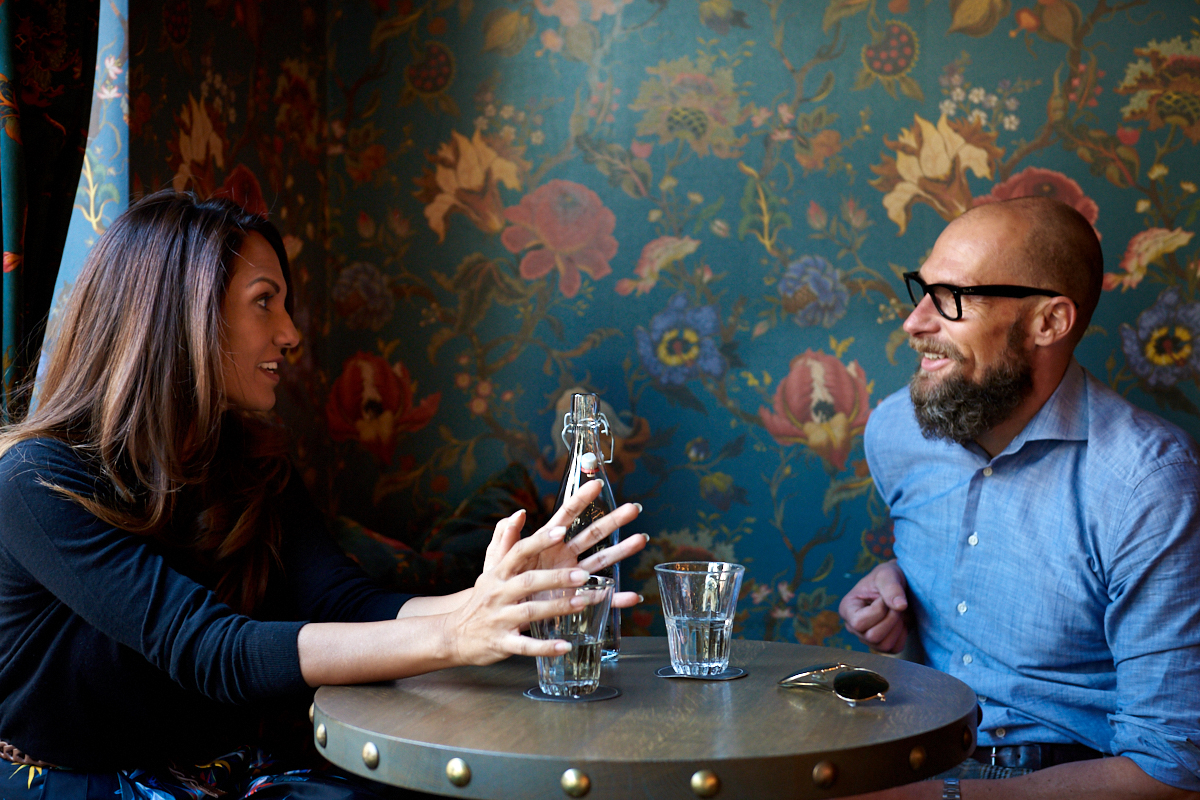
Anna Maier talks to Marco Büchel at the Razzia bar, Zurich.
“Two or three years after I retired, I found peace.”
You are working together to write down the memories that have made a permanent impression on you from the craziness of your time as an athlete. Do you think you’ve processed the fact that you are no longer involved as a competitive athlete?
I have now. Sometimes, I would have liked to have been there myself, rather than watching others do it. The very first time I analyzed a race, when I realized that I was out in the cold, there were tears in my eyes. About two or three years after I retired, I found peace. Now I’m happy I don’t have to go down these steep, icy, dangerous pistes myself any more.
In a way, you’re still there in the thick of it. As a skiing commentator, you still travel to all the places you visited as an athlete. It’s like splitting up but still going to work with your partner.
Yes, there’s something in that. But it was also a gentle transition from my dream to reality. Now I’m starting to build new things for myself. I think having new things to do can make me truly happy, too.
My aim is no longer to look for something to replace what has been, but to look ahead and be happy about what I’ve got. I know I live a damn good life.
Copy: Anna Maier
Images: Jean-Pierre Ritler
Newsletter
Subscribe to our newsletter and you'll get notified every time a new article is online.

